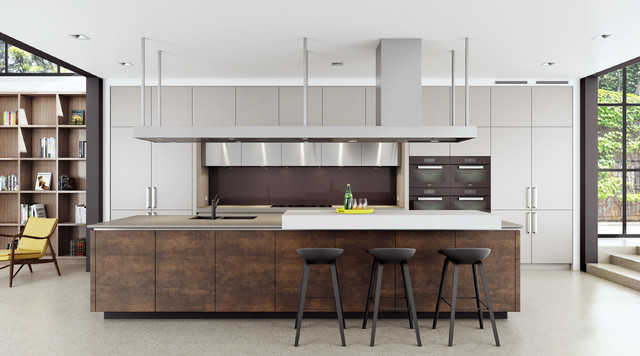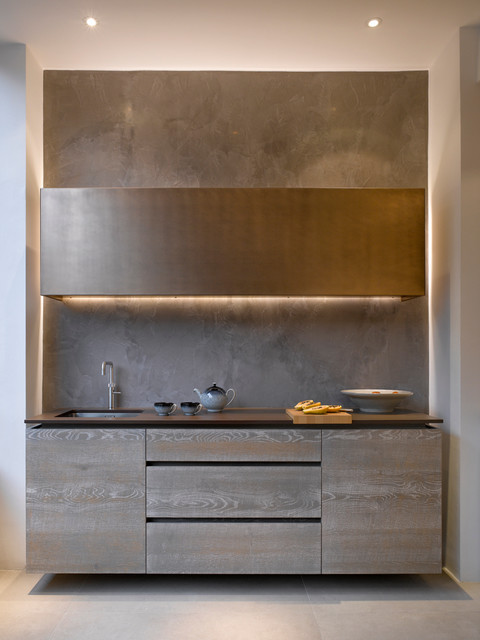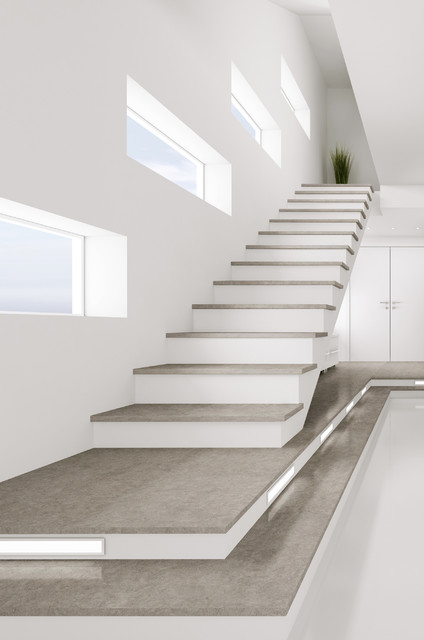Porcelain: The Revolutionary New Benchtop Material
This innovative and virtually indestructible material with multiple uses is taking the Australian market by storm
Choosing a kitchen benchtop material is one of the biggest decisions you will need to make when carrying out a kitchen renovation. There are so many materials to choose from, and each one has its own benefits and drawbacks. However, there is a new product on the market that just might tick every box. Better known to us as porcelain, this new product has an ultra-compact surface, which is why you may also hear it being referred to as a sintered compact surface.
The popularity of this product as a kitchen benchtop material has grown massively in Europe over the last few years and, with its recent introduction into the Australian market, it is about to become one of the most sought after benchtop materials among homeowners here too. But the kitchen is not the only place in our home that we can use this revolutionary product. This comprehensive guide will give you plenty of information if you’re considering an ultra-compact porcelain surface for any room in your home.
PROS
It is virtually indestructible
This environmentally friendly and completely recyclable product is lightweight, resistant to high temperatures and ultra-violet light, and is largely unaffected by wear and tear. It doesn’t stain and isn’t damaged by harsh chemicals. Durability tests have included the use of hammers, blow torches and graffiti paint – none of which have damaged the material.
The idea of being able to use such a hard-wearing product inside our homes and on kitchen benchtops is really exciting designers and homeowners alike – and the list of applications it can be used for is astounding. There are numerous areas in our homes for which porcelain slabs and tiles can be used, both indoors and outdoors, with no special sealing or treatment required.Thickness varies from five millimetres to 20 millimetres depending on the supplier. Which thickness you choose will depend on what you intend to use the material for.
High temperature resistance and unmatched durability mean that kitchen benchtops will be one of the most popular uses of porcelain slabs in our homes. In addition, they are easy to clean and won’t scratch, so you can chop directly on the surface of the benchtop. And because it’s non-porous, it’s a hygienic choice for busy kitchens – every homeowner’s dream.Another exciting feature of this new material is the size of the slabs and tiles. Large 12-millimetre-thick slabs, measuring up to 3200 x 1500 millimetres for use on benchtops, give homeowners and designers the flexibility to design much larger single-piece kitchen islands than would be possible with most natural or engineered stone slabs. These jumbo-size pieces also mean that a larger kitchen island won’t require as many benchtop joins as a smaller one.Key measurements for kitchen islands
CON
Designs are only skin deep
Slabs can be mitred and joined together to create benchtops and furniture pieces with thicker front edges, but one disadvantage of porcelain becomes apparent here. Because designs and patterns are printed on the surface, they are only skin deep, unlike natural stone. When mitred edges are rounded to create a smooth, neat finish, the design or pattern is removed, making the join more obvious.
This skin-deep pattern also means that if you choose, for example, a marble look for your benchtops, having drainer grooves cut into the bench will also result in the pattern being removed in those areas.
NOTE: This is really the only fault I could find, so this revolutionary product still gets a massive thumbs up from me.
WHAT CAN IT BE USED FOR?
Furniture and cabinet facades
Thinner porcelain slabs and tiles are ideal for use on indoor furnishings such as kitchen cabinet fronts and tabletops. It can be placed directly on the existing surface, making it the ideal product to use when renovating because there is no need to remove existing surface finishes first.
Large-format porcelain tiles can be used on high-traffic floor areas for both commercial and residential buildings, including on stairs. These tiles can also be used outdoors, which is fantastic if you want to continue the same flooring through your house and out onto the patio.Contemporary staircases that wow
Ultra-compact surfaces are UV-resistant, meaning their colour won’t fade. Porcelain’s UV-resistance along with its resistance to heat makes the material the perfect choice for outdoor flooring and wall cladding. It can also be used for benchtops and cabinet fronts on outdoor kitchens and barbecue areas, even under the harsh Australian sun. And it’s one of very few products in the residential market that can be used on outdoor cabinets and still be covered under warranty.
Bathrooms can also benefit from using ultra-compact surfaces. Due to the fact that this porcelain material is non-porous, large-format porcelain slabs and tiles can be used as flooring and wall cladding in bathrooms, even in shower areas.Top materials for bathroom tiles
VARIATIONS
Colours and finishes
The colours used in the manufacturing of porcelain benchtops are all made from natural pigments, although the shades available will vary and depend on the supplier. During the manufacturing process, the material can be manipulated to have a smooth or textured finish, from matt to high gloss, depending on the look you would like to achieve.
Designs and patterns are printed on the surface of the product. You can expect to see some exciting designs and patterns such as woodgrain, cement, metallics, rusted steel and marble patterns that rival the look of natural stone, as well as the ever-popular white.These realistic designs and patterns mean you can now incorporate the look of natural and raw materials you might not ordinarily choose to have in your home. For example, now you can choose the look of rusted steel without the drawbacks. We can also expect to see more unusual colours and patterns introduced in the not-too-distant future.
Due to the fact that ultra-compact surface material is new to the market and only specialised fabricators can work with and install it, it’s worthwhile shopping around to get the best price on porcelain. However, the cost of this innovative new product is surprisingly competitive.Regardless of the wholesale price of the material, the cost to consumers will vary greatly depending on the supplier and how much they need to charge. Prices will also vary depending on the thickness and colour you choose, the amount of material ordered and the level of detail required when cutting and installing the material.Expect to pay somewhere in the region of 30 per cent more for a porcelain benchtop than you would for a premium range engineered stone benchtop. This brings the price in at somewhere around AU $1,400 per square metre (NZ $1,466 per square metre), for one of the standard range colours with a 12-millimetre thickness.
This isn’t one for DIY enthusiasts.
Porcelain benchtops can be installed by a stonemason, but they must be accredited to fabricate the product. Ensure that you check this out when engaging a professional. Due to the hardness of the material, specialised tools are required for installation, to avoid damaging it.TELL US
What do you think of this new product? We would love you to share any experiences you’ve had installing and using it in your home in the Comments section below.

















WHAT IS A PORCELAIN OR SINTERED COMPACT SURFACE?
The science behind it
Porcelain is defined as a ceramic product that has been baked at high temperatures to achieve a glass-like, permanently hardened, virtually non-porous material. It is manufactured from a sophisticated blend of natural raw materials, such as powdered clays, using sintered particle technology.
This high-tech process involves fusing the raw materials together using intense temperatures and extreme pressure, much like an accelerated version of the processes that natural stone undergoes in the ground over thousands of years. It combines raw materials that are found in glass, ceramic and quartz together to form a new material in both slab form and tiles. The result is an ultra-compact surface that is virtually indestructible. Plus, there are no harmful chemicals or resins used in the manufacturing process.